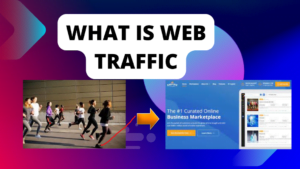
what is web traffic?
What is Web traffic? Web traffic is the lifeblood of any website, representing the flow of visitors who access its content.
in the digital landscape, web traffic refers to the flow of visitors to a website. It is a crucial metric for online businesses and individuals alike, indicating the popularity and visibility of a website. Understanding web traffic and implementing strategies to increase it is essential for online success.
1. Introduction
Web traffic encompasses the visits and interactions that occur on a website. It includes various sources through which visitors access the site, such as search engines, social media platforms, referral links, and direct visits. For website owners, web traffic measures the effectiveness of their online presence and marketing efforts.
2. Types of Web Traffic
- Organic traffic: Visitors who find the website through unpaid search engine results.
- Direct traffic: Visitors who access the website by typing its URL directly into their browser.
- Referral traffic: Visitors who come to the website through external links from other websites.
- Social media traffic: Visitors who discover the website through links shared on social media platforms.
- Paid traffic: Visitors acquired through paid advertising campaigns.
3. Factors Influencing Web Traffic
Several factors influence the volume and quality of web traffic a website receives:
- Search engine optimization (SEO): Optimizing website content and structure to rank higher in search engine results pages (SERPs).
- Content quality and relevance: Publishing high-quality content that attracts and engages the target audience.
- Website design and user experience: Ensuring a visually appealing and user-friendly website layout that encourages visitors to explore further.
- Marketing efforts: Promoting the website through various online and offline marketing channels to increase visibility and attract visitors.
4. Strategies to Increase Web Traffic
To enhance web traffic, website owners can employ the following strategies:
- Content creation and optimization: Regularly publishing fresh, valuable content that targets relevant keywords and addresses audience needs.
- SEO techniques: Implementing on-page and off-page SEO tactics to improve search engine rankings and increase organic traffic.
- Social media marketing: Sharing content on social media platforms to reach a wider audience and drive traffic back to the website.
- Email marketing: Building an email subscriber list and sending targeted campaigns to drive repeat traffic and conversions.
- Paid advertising: Investing in paid advertising campaigns on search engines, social media, and other platforms to attract targeted traffic quickly.
5. Analyzing and Monitoring Web Traffic
Website owners can use tools like Google Analytics to track and analyze various metrics related to web traffic, such as:
- Traffic sources: Understanding where visitors are coming from (e.g., search engines, social media, referrals).
- Key performance indicators (KPIs): Monitoring metrics like page views, bounce rate, time on site, and conversion rates to assess website performance.
- Conversion tracking: Identifying the actions visitors take on the website, such as making a purchase or signing up for a newsletter, to measure the effectiveness of marketing efforts.
6. Conclusion
In conclusion, web traffic is a vital aspect of online success, as it directly impacts a website’s visibility, engagement, and conversion potential. By implementing effective strategies to increase web traffic and continuously monitoring performance metrics, website owners can optimize their online presence and achieve their business objectives.

